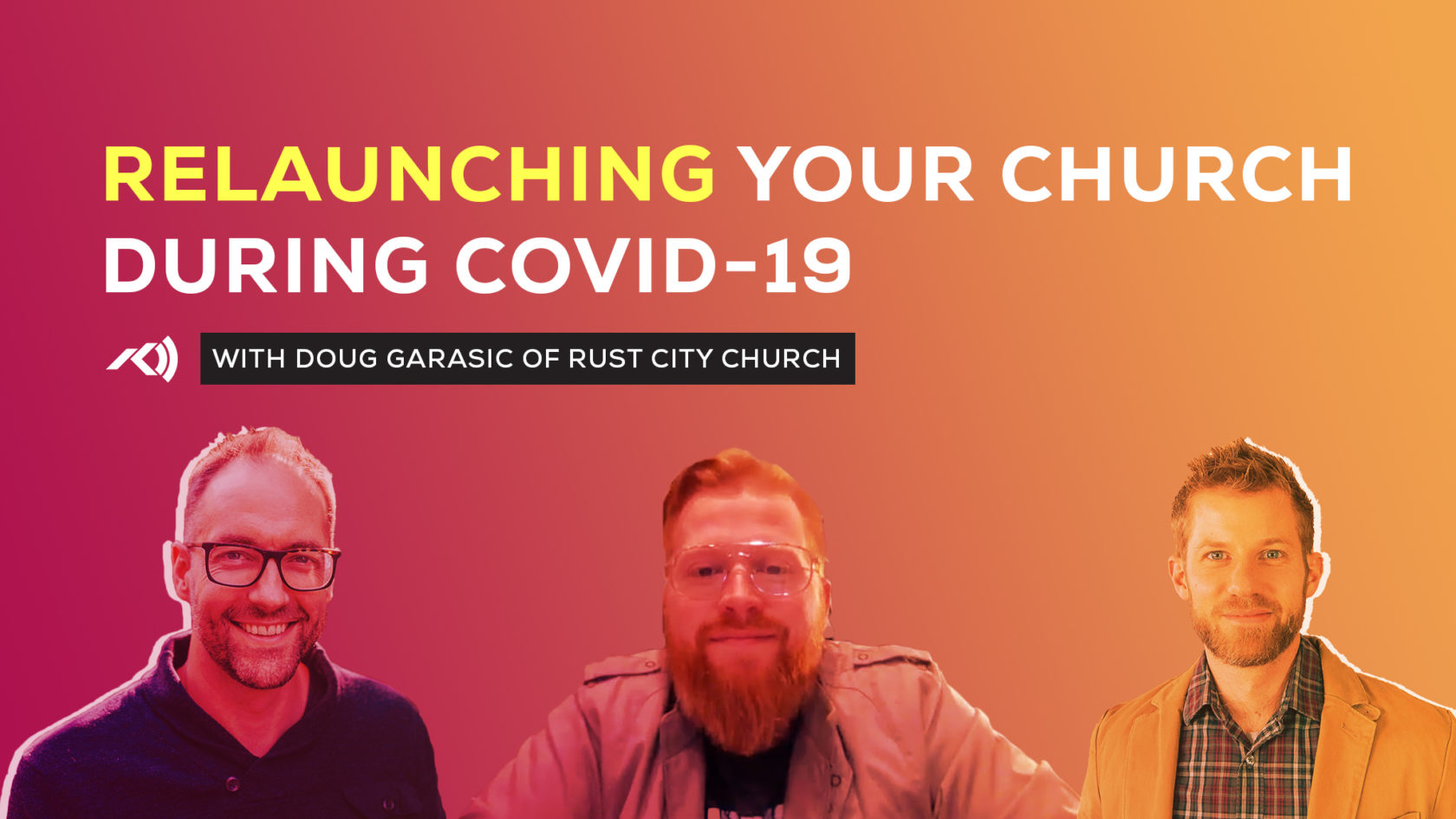Doug and Stephanie Garasic planted their Niles, Ohio church in 2011. Early on, they called ArtSpeak to help them choose their name and guide them through our branding process.
Doug said, “We named it Rust City Church, which we love and is local and original to our community. We’re in the rust belt in America, and it felt like a place that needed to be revived. We revived the rust.”
Now, they’re a growing multisite church of more than a thousand members. Rust City employs seventeen people full time and has even established a school of ministry.
We loved working with Doug and found him to be inspiring, forward-thinking, and even a little snarky—in a fun way! We called to catch up with him and find out how their church is doing right now.
Here’s what we learned.
Establishing Focus
When the coronavirus pandemic hit, Doug felt disoriented, saying, “I feel like Kevin Costner from Waterworld!” Still, he sees a silver lining: An opportunity to relaunch his church.
He said, “There were a lot of things we delayed doing because Sunday comes every week.” But now, they’re trying to make the kinds of improvements they were too busy to make before.
They began by narrowing their focus, deciding to do three things well:
- Live-streaming: Besides weekend services, they added a laid-back nightly broadcast
- Outreach: They’ve started calling everyone in their database, looking for needs to meet
- Giving: They’ve been buying food to give away “in a time of scarcity”
The result is this: Rust City has doubled their attendance and seen their two biggest giving weekends in the past twelve months—even rivaling Christmas! They accomplished this by implementing (or at least reinforcing) four paradigm-shifts.
Reframe Volunteering
Rust City has found unique ways to engage their volunteers during the quarantine.
First, to keep things as “normal” as possible, volunteers get together with Doug twenty minutes before services over a Zoom call. They pray and get excited about what God’s going to do, even though they’ve pre-recorded the services.
That’s because much of the ministry happens through online engagement, which is the primary way Doug asks volunteers to serve. He tells them, “Comment and share, comment and share.”
Volunteers have used their social networks to get the word out. The practice attracts more people to online services, and more potential donors learn what Rust City is doing to help the community.
Second, Rust City has exported its entire database—several thousand people—and distributed names and numbers to a team of volunteers. Each volunteer gets a simple script. They call and ask who needs prayer, money, or food. Then, they meet those needs as efficiently and quickly as possible.
This simple concept has been incredibly effective, and Rust City is careful to share each win through social media and email. As the church continues to “comment and share,” it’s inspired giving from among their ranks and beyond.
Even a misdialed number turned into a good thing. The person had never heard of Rust City, but the volunteer still asked if she needed anything. She said she did—she hadn’t been able to find eggs.
After they met the need, Doug said, “We celebrated it. And people went nuts, saying ‘That’s our church!’”
There’s been a side-benefit, too. As callers find incorrect information or people have moved on from Rust City, their staff can use those notes to clean up their database. It’s helped the church to complete another task they hadn’t had time to do before now!
Learn from the “Online Campus” Model
Rust City is a multisite church that has done some online streaming before, but now Doug sees the need to launch an entire online campus with a dedicated pastor.
Doug quoted Warren Buffett, who said, “Only when the tide goes out do you discover who’s been swimming naked.” Doug joked, “When the waters went out, it showed us that we stink online!”
But the church has identified two groups of people who benefit from online church:
- People who live too far away to attend Rust City
- People who aren’t ready to join a community but want to “test things out”
He says approaching the online church like a campus means more than streaming. Instead, it’s about going deep spiritually through small groups, which they’ve always called “parties.”
Now, Rust City is establishing fifty Zoom “Parties” around several different sub-communities: men, women, young adults, teens, entrepreneurs, and “new to Jesus.”
Doug admits the idea is still in the experimental phase. He said, “Our church people will sign up because they’re missing the community. But we’re curious how many people will sign up who have never been to church before.”
Steward the Gift of Generosity in Your Church
Rust City takes financial gifts very seriously. They had already worked to move most of their giving online, much of it recurring. They also have a Generosity Pastor, a person whose job is “stewarding the gift of generosity in our body.”
In this time, however, they’ve found a unique way to engage first-time givers. They send a text message that says:
“Hey [NAME], this is Pastor Doug from Rust City. I wanted to thank you for your first-time gift of generosity to our church. It is helping to reach our community. I know these are crazy times, but God is in charge. We are praying for you. Let me know if you need anything. By the way, this is my personal cell phone number.”
Doug says, “I think giving away your cell phone number is the easiest equity win that you could ever get from somebody in authority. It’s so personal. It’s so relational.”
And they take those who have “chosen to be generous to God’s Kingdom” seriously, calling it a “spiritual activity.” Doug said, “I want to celebrate that, cheer it on, and help them on their journey.”
Advertise Less, Celebrate More
Instead of continually asking for help and money, Rust City has decided to celebrate how their church has been able to help people. Doug believes it’s more effective to inspire people to give out of a sense of celebration rather than obligation.
Doug encourages other congregations to do more of this in general. He said, “We’re not storytelling, and we’re not keeping records of how good God is in our church.” Doug recommends churches showcase what God is doing in the church at large, saying, “We’re part of the solution, not the problem.”
Key Takeaways and Resources
- Go live nightly
- Ask volunteers to “comment and share, comment and share”
- Have volunteers call everyone in your database so you can identify and meet needs in the community
- When you’ve met a need, let your congregation know through email and social media
- Send a text-message follow-up to first-time givers
- Advertise less, celebrate more
For more about Rust City, visit their website. Doug Garasic is a pastor coach with Church Boom, which you can learn about here.
How to Reposition Your Organization for the New Landscape
We’re in the midst of a storm that will change the coastline of our culture. Many organizations realize that what has worked for them in the past—their message, strategy, branding, and online presence—won’t work in the days ahead.
If you’re ready to redefine who you are in this moment, we have a free tool to help you get started. Our Branding Questionnaire will help you to think deeply about who you are, what you want to do, and how you can serve people more effectively than ever.
You can download the free questionnaire right here.
